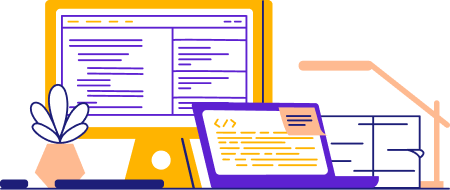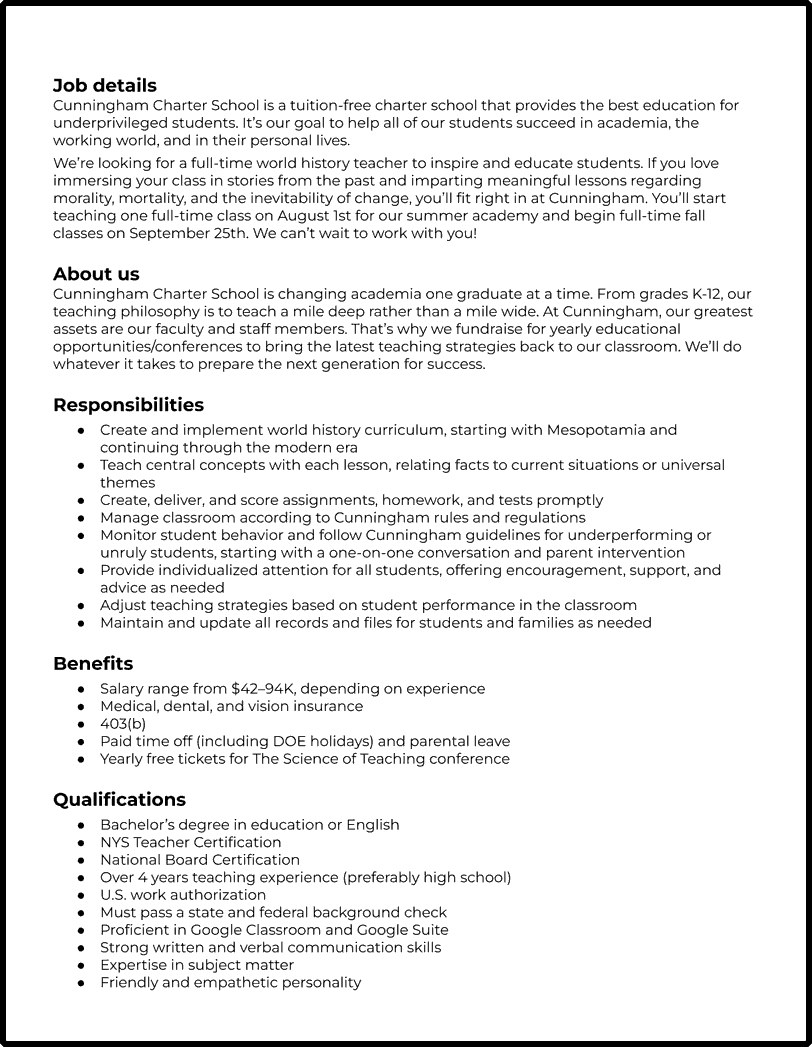An article from Merrimack College explained that teachers serve as role models, educators, counselors, and encouragers. One study revealed five traits of excellent teachers:
- They take time to create intentional relationships with their students.
- They’re passionate about their field.
- They set high expectations for their students.
- They mentor other teachers.
- They go “above and beyond” for their students.
According to Edutopia, teachers who helped high school students with noncognitive skills (like self-regulation, motivation, and adaptability) increased the student’s attendance and the likelihood of graduation.
Teachers play vital roles in society, so it’s crucial to hire the best possible. That’s why BeamJobs is here to help you write a stunning job description that will help attract the best teachers.
Why this job description works
- It’s important to demonstrate the type of personality you’re looking for in your ideal hire, which you can do by using the intro of your job description to tell a story about your company.
- Great applicants want to know who you are. Offer a concise snapshot of your organization and what its environment is like!
- Using the right tone and providing some context for the job will hint at which resume skills applicants should include in their teacher resumes.
- You don’t always need to list starting dates, but for seasonal or temp jobs that only require someone to be there during a certain part of the year, employment dates are crucial!
- Provide clear requirements and lead in with your school’s start and end dates early on in your teacher job description.
Why this job description works
- While the intro of your job description should highlight the fun attitude that you’re looking for, make sure you outline any strict organizational policies or curriculum standards.
- You want to see credentials that line up with your requirements in an elementary teacher resume, so provide a well-rounded overview.
- Include qualification examples like lesson planning, multisensory learning, and relationship building in your elementary teacher job description.
- Technical requirements are important, too! Your ideal hire will need to know how to juggle in-person and remote learning, so mention Zoom, Google Meet, or other programs by name.
- Getting technical also encourages candidates to mention any seemingly extraneous resume-related hobbies or interests, like game development or nature walks, that might enhance their desirability for a youth-focused role.
Why this job description works
- Plenty of awesome people are out there writing high school teacher resumes, so make sure you immediately list which subject you need a teacher for! Specify whether the position is for English, history, science, etc.
- Your high school teacher job description should also outline values, such as academic excellence and adaptability to various socioeconomic backgrounds, that directly affect someone’s teaching style.
- By mentioning the number of students per class, you can give candidates an idea of how in-depth their relationship with each student will be.
- Education and certifications should immediately pop out on any resume, but academic credentials are especially important here!
- Clearly laying out all your qualification requirements will let applicants know how much focus to put on their educational background.
Write a Teacher Job Description to Win the Right Staff

Many job descriptions fail to realize how important a job description is to future teachers, which shows in their poor execution. From terrible formatting, endless lists of requirements, and paragraphs of filler text, we’ve encountered it all. We’ve seen company bios take up half the page or job descriptions with less than five sentences.
One memorable teacher job description listed nothing more than “Faculty role in English department.” These job descriptions show a disregard for future colleagues and needlessly complicate the application process for folks trying to write a decent teacher cover letter or resume.
Make a good first impression
Although most bad job descriptions are easy to catch, teachers especially will notice if your job description is poorly written. They spend all day communicating and writing, so they’ll spot content, formatting, or grammar errors. A professional, error-free description prevents losing applicants to the hundreds of other schools vying for a new teacher.
A job description is the first contact you’ll have with your future teachers, so spend the time to attract the top candidates. Good job descriptions give applicants the necessary information in the correct dosage.
Write your job description in logical stages
That’s why it’s best to write in stages. We know it’s intimidating to start writing, so we recommend jotting down the bare minimum first; keywords, phrases, bullet points—just put words on the page. As you go, continue adding details until it’s complete. Then add one more crucial component: why you’re hiring in the first place.
Yes, you need a teacher, but why do you need them? Is there an opening in the high school for a calculus and statistics teacher? Is your music program dwindling? Tell the applicant in no uncertain terms what you need.
Tighten and perfect your teacher job description
You need to revise and edit your work no matter how well you write. Go back with a red pen and “grade” your piece. Take out filler, replace vague language, and cut anything your future teacher doesn’t need (Your school’s history and mission might be worth five paragraphs to you, but it’s unnecessary to applicants).
Then take a look at your job description’s tone. Even if you’re hiring a kindergarten teacher, you should still strike a pleasing balance between personable and professional.
Once you’ve revised, have a few people read through your work to ensure it’s concise, informative, and easy to read. You’ll also need to take one last look at your formatting. Just as teachers customize their teacher resumes when applying to particular jobs, you’ll need to tailor your formatting, so your job description looks perfect. By taking the time to craft your job description well, you can attract the highest caliber teachers to care for your students.
Begin by Outlining Your Teacher Job Description

As every teacher knows, the blank page can be intimidating. Here’s an outline to get you started writing an outstanding teacher job description.

Job details
You can call this section an introduction of sorts. Here’s where you’ll name your organization, your mission, why you’re hiring a teacher, and what they’ll be expected to do. If that sounds like a lot, don’t panic.
This section shouldn’t be more than 10 sentences (and likely should be shorter). Be frugal with what you include here, as it’s not the star of the show. Give the basics.

About us
Many job descriptions think this section is the most important and must be several paragraphs in length. This isn’t the case—the requirements and qualifications sections are more important, but that doesn’t mean this part isn’t necessary. This is where you’ll describe more about your organization, its values, and its goals. Teachers will need to know what your workplace culture is like and what to expect from the organization as a whole.

What you’ll be doing
A rose by any other name would smell as sweet; this section is similar. This is where you’ll list a general summary of your new teacher’s duties. This is not where you list every conceivable task they’ll accomplish—teachers wear many hats, so listing everything would take far too long. Summarize their responsibilities and keep it around 10-15 bullet points of moderate length.
- Create and implement curriculum to teach world history, starting with Mesopotamia continuing through the modern era
- Prepare and assign homework, projects, and extra-academic assignments (including reading Bingo or history Jeopardy) according to curriculum and student age/ability

Qualifications
Teachers will need certification and a degree, most likely, but you should also include any other required qualifications specific to your organization. This usually means many years of experience, soft skills, and technical competencies. Just remember that no applicant will perfectly meet all of your idealized qualifications; avoid going overboard with laundry lists of expectations.
- Bachelor’s degree in elementary education from accredited college or university
- Teaching certification required (must pass CBEST and CSET Multiple Subjects tests)
- Expertise in subject matter
- Friendly and empathetic personality

Benefits
Here’s where you can list a salary range and the perks of working with your organization. It’s best to be upfront about what you offer to indicate your honesty and appreciation for your teachers. It can also entice applicants to apply to your organization over the competition when they know upfront how they’ll be compensated.
The Many Roles, Duties, and Functions of Teachers

Teachers are a vital part of a student’s life. They know when something is happening behind the scenes and can help students with far more than just homework. They can console, encourage, educate, inspire, and support students on any given day. More often than not, they fulfill roles far outside what people consider the typical responsibilities of the job. While no teacher will be performing all of these duties, it’s a great place to glean ideas.
We’ve provided a list of those extra roles that teachers fulfill to guide your job description further.

Public servant
- The very core of a teacher is service. Many teachers go out of their way to serve their community, from assisting with school-sanctioned events to providing materials for students; they embark on the difficult journey of imparting knowledge to the next generation.
- Despite personal challenges and external obstacles, they give their time, energy, and effort. This is one unspoken aspect of the job that teachers know all too well but are willing to provide for the good of those around them.
- Assist with school-wide projects/events, including the annual science fair and Math Olympics; attend community and school events to encourage students; collaborate with school faculty, staff, and executive board; and educate families on available resources within the community such as counseling, health care, and more.
- This role will require a driven, compassionate person committed to going above and beyond for their community. Must be honest and resilient, with strong communication and collaboration skills.

Academic coach
- This is a teacher’s most obvious function, but it’s not to be taken lightly. Teachers must explain complicated concepts in new ways, test new methods of instruction, and devise learning strategies and processes for each student.
- They often create content themselves if there are limited resources available. It’s a tiring yet rewarding cycle to see students go from barely passing to an A+.
- Create curriculum and lesson plans according to school policies and student ability, present information to students in daily lectures, prepare/assign/grade assignments throughout the week, research resources for lessons, and integrate technology and external materials to further student understanding.
- This role will require expertise in their field and knowledge of different teaching strategies to appeal to all students. Must be empathetic, flexible, and an excellent critical thinker.

Planner
- As aforementioned, teachers have to structure lessons and class time to meet specific objectives according to school standards and student capabilities. Their studies must fit within the school’s overall curriculum and meet state requirements to prepare students for standardized testing.
- Teachers must also set up their classroom for success, with an effective layout and proper materials for their subject.
- Organize student files and other paperwork, maintain student records and documentation, collect and organize classroom materials, plan curriculum and lesson plans to fit the yearly school schedule, develop an office hours schedule, update as needed, and grade all assignments on time to stay on schedule.
- This role will require flexibility, organization, and time management skills. Must also have expertise in effective classroom strategies and lesson design.

Public speaker/communicator
- Teachers have to pass on knowledge to their students, so they must be excellent communicators to help students understand the material.
- Their interpersonal skills are worth noting, too— they can talk to students, parents, colleagues, and board executives alike. No matter the audience, a teacher can tell anyone about their subject and convey it well.
- Present lectures on general subjects using SmartBoard and presentation slides, give constructive feedback on student assignments, meet with parents to discuss their child’s overall progress, meet with colleagues to discuss teaching methodologies and current concerns, and convey information as needed to the school board or other faculty/staff.
- This role will require strong written and verbal communication skills, a personable demeanor, and a confident attitude.

Mediator
- Conflict is inevitable in any job, but teachers must defuse arguments and find solutions on multiple fronts. Teachers are excellent negotiators who can fix problems ethically and safely, whether they’re explaining a bad grade to a student, discussing poor behavior with parents, or defending their actions to an executive board.
- Negotiate learning plans with parents to help students learn more effectively, provide empathetic feedback to student concerns, and provide documented evidence for all decisions made regarding grading, assignments, scheduling, and other activities to give to the school board as needed.
- This role will require compassion, patience, and excellent interpersonal communication skills. Must be able to communicate calmly and professionally no matter the circumstances.

Leader/role model
- Students look up to teachers, so it’s up to them to model good behavior and academic skill. In the eyes of the public, teachers represent high academic standards and professional conduct. Thus, they must exemplify the qualities of a good leader and role model.
- Model professional standards of behavior, exhibit a caring, dedicated attitude, and encourage good behavior from students. Must uphold professional and ethical code of conduct at all times.
- This role will require strong leadership ability, critical thinking skills, and commitment to ethical standards.

Student support
- Teachers go above and beyond to support students with far more than academics. They are the ones who make school a safe, welcoming space for everyone. By encouraging and offering assistance, teachers can help students thrive both in the classroom and out.
- Encourage students in their personal lives and reward good behavior. Actively listen to student concerns, suggest solutions as needed, and assure students they are cared for and valued. Must be available for office hours as scheduled.
- This role will require empathy, compassion, a personable demeanor, and excellent interpersonal communication skills.








